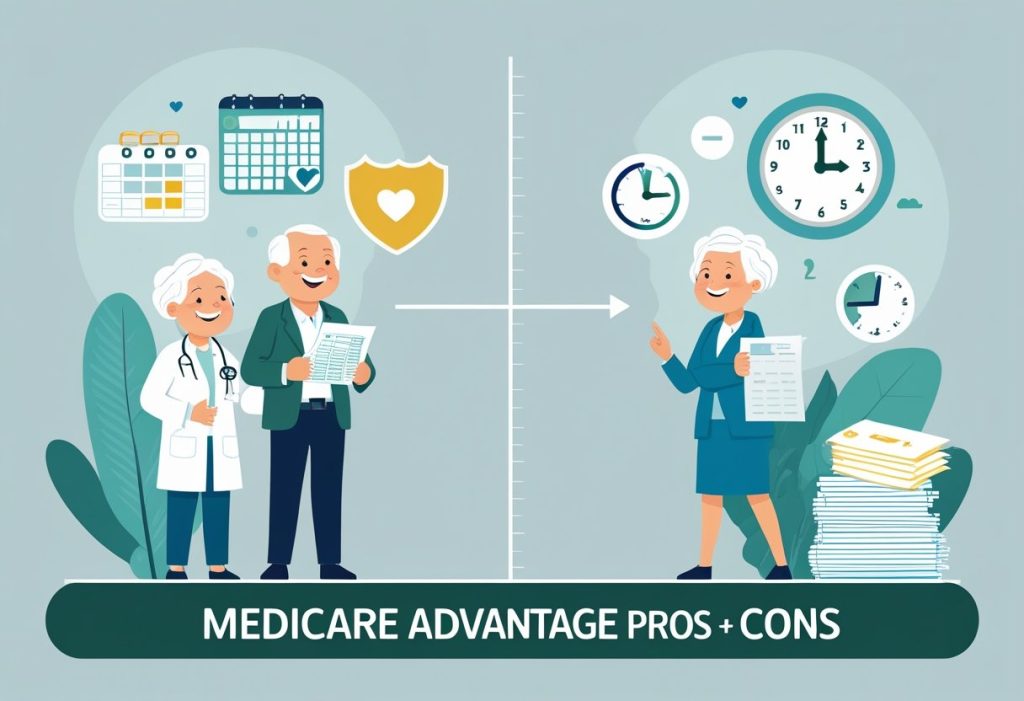Navigating the world of Medicare can be daunting, especially when it comes to choosing between Original Medicare and Medicare Advantage. Medicare Advantage offers a compelling alternative, providing bundled benefits and potentially lower out-of-pocket costs, but it also comes with restrictions like provider networks that may not suit everyone’s needs. Understanding the pros and cons of Medicare Advantage is essential for making an informed decision about your healthcare coverage.
At The Modern Medicare Agency, our licensed agents are here to guide you through the complexities of Medicare plans without the stress of added fees. You can have personalized discussions with real people who understand your unique needs and can help identify the best Medicare packages tailored specifically for you. This one-on-one assistance ensures that you find a plan that aligns perfectly with your healthcare requirements.
As you explore your options, weighing the benefits against the limitations of Medicare Advantage will empower you to select the right plan for your situation. With expert insights and individualized support, you can confidently navigate the Medicare landscape and make choices that will benefit your health and financial well-being.
Understanding Medicare Advantage Plans
Medicare Advantage Plans, also known as Part C, provide alternative ways to receive your Medicare benefits. These plans often include additional services beyond Original Medicare, appealing to those seeking comprehensive coverage. Below are the key details about these plans.
What Is Medicare Advantage?
Medicare Advantage is a type of health insurance plan that provides you with your Medicare benefits through private insurance companies. These plans include coverage for both Medicare Part A (hospital insurance) and Part B (medical insurance).
Most Medicare Advantage Plans offer additional benefits such as dental, vision, and wellness programs, which Original Medicare does not cover.
These plans may come with a premium, but they can also have low or even zero-dollar premiums. You will typically pay deductibles, copayments, and coinsurance for services.
Types of Medicare Advantage Plans: HMO vs. PPO
There are several types of Medicare Advantage Plans, with the two most common being Health Maintenance Organization (HMO) and Preferred Provider Organization (PPO).
HMO Plans require you to choose a primary care physician (PCP) and get referrals to see specialists. These plans often have lower out-of-pocket costs but are more limited in the providers you can use.
PPO Plans offer more flexibility in choosing healthcare providers. You can see any doctor or specialist without a referral, although you will save more if you use network providers. These plans may have higher premiums and out-of-pocket costs.
How Medicare Advantage Differs from Original Medicare
Medicare Advantage differs significantly from Original Medicare in both coverage and structure. With Original Medicare, you receive benefits directly from the government without having to enroll in a private plan.
While Original Medicare covers most hospital and outpatient services, it does not include additional benefits like vision or dental.
Medicare Advantage Plans often provide additional covered services, and many include a cap on out-of-pocket spending. This means your overall medical expenses can be more predictable compared to Original Medicare.
Choosing Medicare Advantage through The Modern Medicare Agency can simplify your journey. Our licensed agents work one-on-one with you to find plans that suit your needs, all without extra fees.
Key Advantages of Medicare Advantage
Medicare Advantage offers several significant benefits that can enhance your healthcare experience. You will find comprehensive coverage, extras like gym memberships, and protections against high out-of-pocket costs, making it a valuable option for many beneficiaries.
Comprehensive Coverage and Extra Benefits
Medicare Advantage plans combine the benefits of Original Medicare (Parts A and B) into a single package. This gives you access to hospital and medical services under one plan.
In addition to standard coverage, these plans often include extra benefits. Some plans offer services like routine vision and dental care, wellness programs, and gym memberships. These additions can significantly improve your quality of life and health outcomes.
Choosing a plan with additional offerings means you won’t have to purchase separate insurance to cover these services. This all-in-one approach can simplify your healthcare experience and help you save money.
Prescription Drug Coverage (Part D)
Many Medicare Advantage plans include integrated prescription drug coverage (Part D). This allows you to manage your healthcare more effectively by having all your medical and medication needs under one plan.
With Part D included, you can get access to essential medications at lower costs. Most plans feature a list of covered drugs, which can help you understand your medication expenses upfront.
If you require regular prescriptions, having this coverage can significantly help in budgeting your healthcare expenses and avoiding surprise costs.
Annual Out-of-Pocket Cost Limits
A key feature of Medicare Advantage is the annual out-of-pocket cost limit. This cap protects you from excessive healthcare expenses during the year. Once you reach this limit, you won’t have to pay for covered services.
This aspect is particularly important for those who might face high medical bills. With Original Medicare, there is no limit to what you can spend, but Medicare Advantage offers a safety net that can provide peace of mind.
Ensuring you choose a plan with a reasonable out-of-pocket maximum can help you plan your budgeting effectively and safeguard your finances.
Choosing The Modern Medicare Agency can help you navigate these options effectively. Our licensed agents are available to assist you in selecting the best Medicare Advantage plans tailored to your needs, without hidden fees.
Potential Drawbacks of Medicare Advantage
While Medicare Advantage plans offer several benefits, they also come with notable drawbacks that you should consider before enrollment. Understanding these issues can help you make informed decisions about your healthcare.
Restricted Provider Networks
Medicare Advantage plans often feature restricted provider networks. You might find that only specific doctors and hospitals are covered under your plan. This restriction can limit your choice of healthcare providers significantly.
If you prefer to see a specialist or a facility not in your network, you may face higher out-of-pocket costs or require a referral. Finding a primary care provider who meets your needs becomes crucial, as navigating network limitations can be challenging. Ensure that your preferred healthcare providers are included in the plan’s network before making a decision.
Prior Authorization Requirements
Prior authorization is another common hurdle associated with Medicare Advantage plans. Many services, treatments, or medications require approval from the insurer before you can access them. This process can delay necessary care or lead to confusing situations.
If your provider recommends specific treatments, you might need to wait for authorization, which can be stressful. Furthermore, if the authorization is denied, you may need to explore alternative treatments or pay out of pocket. Understanding these requirements early on can help you manage your care better.
Plan Variability and Coverage Limitations
Medicare Advantage plans vary widely in terms of coverage and benefits. Not all plans will cover the same services, which can lead to unexpected out-of-pocket costs. For example, some plans may not cover dental or vision services comprehensively, while others may have restrictions on certain medications.
It’s essential to read the fine print of any plan you’re considering. You may find some plans impose annual limits on care, which may not suit your healthcare needs. The variability among plans can lead to confusion, making it vital to assess your specific requirements carefully.
Choosing The Modern Medicare Agency ensures that you work with licensed agents who understand these nuances. They help you navigate the complexities of Medicare Advantage plans, ensuring you find an option that fits your needs without excess costs.
Comparing Medicare Advantage and Original Medicare
When deciding between Medicare Advantage and Original Medicare, consider the cost differences, provider flexibility, and supplemental coverage options that each plan offers. These factors directly affect your healthcare experience and could influence your choice of coverage.
Cost Differences and Impact on Beneficiaries
Medicare Advantage (Part C) often has lower monthly premiums than Original Medicare. Many plans include additional benefits like vision or dental, potentially reducing your out-of-pocket costs. However, they may require copayments for services, which could add up depending on your healthcare needs.
Original Medicare consists of Part A (hospital insurance) and Part B (medical insurance). While it generally has no monthly premium if you’ve paid Medicare taxes, you will face deductibles and coinsurance for services. Medigap policies can help cover these costs, but they involve additional monthly premiums. Understanding these differences helps you choose the best financial path for your healthcare.
Flexibility and Provider Access
With Original Medicare, you can see any doctor or hospital that accepts Medicare without worrying about network restrictions. This allows for a broader choice of healthcare providers, which can be critical for specialized care.
Medicare Advantage plans, on the other hand, might limit you to a network of doctors and hospitals. While some plans offer out-of-network access, it often comes with higher costs. If you have preferred healthcare providers, ensure they participate in the Medicare Advantage plan you consider. This flexibility can significantly impact your overall experience and satisfaction with your care.
Supplemental Coverage Options
Original Medicare does not cover everything, particularly for out-of-pocket expenses. That’s where supplemental policies like Medigap come in. They fill gaps in coverage, helping you manage costs effectively. This coverage can be important if you frequently need medical care or medications.
Medicare Advantage, typically, does not allow for Medigap plans, but some may include additional coverage like vision, hearing, and wellness programs. This can simplify your insurance situation since everything is bundled into one plan. Evaluate your health needs and check how these options align with Medicare requirements to find the right fit.
For tailored assistance in navigating these choices, consider reaching out to The Modern Medicare Agency. Our licensed agents provide personalized support, helping you find Medicare packages that perfectly suit your needs without hidden fees.
Enrollment and Choosing the Right Plan
Navigating Medicare Advantage enrollment involves understanding key periods and factors that influence your choice. This process is crucial for maximizing your healthcare benefits and ensuring you select the right coverage for your needs.
Enrollment Periods and Eligibility
Medicare enrollment includes specific periods when you can sign up for coverage. The standard enrollment period for Original Medicare is from January 1 to March 31 each year. You can enroll in a Medicare Advantage plan during the same timeframe, along with the Medicare Advantage Open Enrollment period from October 15 to December 7.
If you qualify for certain circumstances, you may also have a special enrollment period (SEP). SEPs allow you to enroll or make changes outside the regular enrollment windows. Qualifying factors for SEPs may include moving, losing other coverage, or experiencing changes in your health that affect your needs.
Factors to Consider When Choosing a Plan
Selecting the right Medicare Advantage plan requires careful consideration of several factors. Start by assessing your healthcare needs, including existing conditions and anticipated medical services. Look for plans that provide adequate coverage for necessary services like hospital visits, medications, and specialist care.
Next, evaluate the costs associated with different plans, including premiums, deductibles, and copayments. Important elements to review include:
- Network: Ensure your preferred healthcare providers are included.
- Benefits: Compare additional services like dental, vision, or wellness programs.
- Prescription Drug Coverage: Check if your current medications are covered under the plan’s formulary.
Switching Between Plans
You may want to switch Medicare Advantage plans if your
Frequently Asked Questions
Understanding the nuances of Medicare Advantage can help you make informed decisions. Below are some common queries related to its potential drawbacks, comparisons with traditional Medicare, and experiences from users.
What are the potential drawbacks of enrolling in a Medicare Advantage plan?
Medicare Advantage plans can come with limitations such as network restrictions, which may require you to use specific healthcare providers. Additionally, some plans have varying out-of-pocket costs that can lead to unexpected expenses for certain services.
How does Medicare Advantage compare with traditional Medicare?
Unlike traditional Medicare, which allows more flexibility in choosing doctors and services, Medicare Advantage plans often require you to stay within a network of providers. This restriction can limit your options for care, especially if you have established relationships with specific healthcare professionals.
Can you explain the downsides of Medicare Advantage plans?
Some downsides include the necessity for referrals to see specialists, which may delay care. Moreover, the coverage for certain services, like out-of-network care, can be more limited compared to traditional Medicare. Some enrollees find that their specific healthcare needs are not fully met by these plans.
What are the limitations of Medicare Advantage that enrollees should consider?
Medicare Advantage plans often include annual limitations on coverage. There can also be restrictions on covered prescriptions or higher costs for certain medications. Additionally, these plans may not cover all the services that original Medicare does.
Why might some users report negative experiences with Medicare Advantage plans?
Negative experiences can stem from issues like claim denials or unexpected out-of-pocket costs. Users may find that the actual benefits received do not align with what was initially promised. Furthermore, complications can arise when seeking care outside of a plan’s network.
In what situations is a Medicare Advantage plan less beneficial than a Medicare Supplement plan?
If frequent medical care is needed or if you prefer more flexibility in choosing providers, a Medicare Supplement plan may be more suitable. These plans typically cover a wider range of services without network constraints, providing peace of mind for those with ongoing health issues.
For personalized assistance and to explore your options, consider reaching out to The Modern Medicare Agency. Our licensed agents are real people who can guide you in finding Medicare packages tailored to your specific needs without incurring extra fees.






